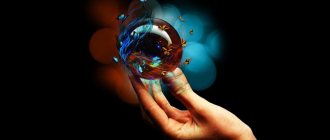Distracted attention is a fairly serious disorder of the nervous system that can affect any person. Sometimes absent-mindedness goes away on its own, and sometimes, on the contrary, it provokes even bigger problems.
Attention deficits and accompanying symptoms can cause severe discomfort and interfere with normal functioning. So what is absent-mindedness and inattention from a medical point of view, how does this condition manifest itself and how to deal with it?
What is absent-mindedness?
First of all, absent-mindedness is inattention and constant forgetfulness that regularly accompanies a person. However, this should not be considered a vice, because absent-mindedness is not a lack of memory, but the inability to concentrate on important things. A person is not born absent-minded, but becomes one throughout his life.
Absent-minded man
There are several varieties of this deficiency, which are acquired by a person for various reasons:
- functional absent-mindedness
- poetic absent-mindedness
- minimal distraction
Basic Concepts
If you are able to absorb information, remember it and then reproduce it when necessary, you have an excellent memory. But as soon as a failure occurs in one of these stages, it’s time to think about whether you are treating yourself correctly? Because forgetfulness or inattention is not congenital, except in cases of psychiatric abnormalities. This means they arise as a result of our incorrect lifestyle. Let's first distinguish between these two concepts, because they mean slightly different states.
Forgetfulness is directly related to difficulties with memory. Do you remember in the article that we discussed that it can be short-term and long-term? So, information that has entered a short-term reservoir evaporates from it very quickly
To keep it in the long-term zone, you should randomly pay attention to it. And this is where absent-mindedness comes in, namely, difficulty concentrating this same attention
And these two factors can be the cause of entire disasters, if a person with any of the above violations is responsible for other people, for example, while driving an airplane or train.
The symptoms, I think, are familiar to everyone: a feeling of indifference to some processes and events, the inability to focus and concentrate, a feeling of powerlessness, excessive relaxation, inactivity
Frequent experiences of boredom, unsuccessful attempts to remember something important, leading to irritability and dissatisfaction. Sometimes the effect of déjà vu occurs, that is, when it seems that what is happening now has already happened before
Excessive relaxation, sometimes similar to irresponsibility and carelessness, as a result of which others have a desire to take control of the fulfillment of some of your obligations or, in general, your life.
But before looking for methods to deal with this, let's explore the probable causes of disturbances in cognitive processes.
Functional absent-mindedness
Functional absent-mindedness can arise against the background of monotonous and monotonous work in every person. It also intensifies when a person has sleep disorders, regular headaches or certain diseases.
It is not uncommon for a sufferer to feel a loss of strength and complete disinterest in the events taking place around him. Such absent-mindedness can be acquired with age and often a person’s thoughts become vague and feelings are not bright.
Age-related absent-mindedness
Varieties of manifestations
Distracted attention syndrome can manifest itself in different ways, namely:
- Insufficient concentration - absent-mindedness. As a result of this disorder, there is a decrease in the ability to remember what is seen or heard. Inherent in people who are highly sensitive to various conditions (fatigue, anxiety, lack of sleep).
- Rigidity is slowness, inhibition, in which there are problems with switching from one topic to another. This condition is observed in patients with epileptic syndrome, hypomania, and hebephrenia.
- Unstable - spasmodic attention . This condition is characterized by frequent jumping from one topic to another, which results in memory problems. Instability of attention often occurs in children who have attention deficit hyperactivity disorder (ADHD), which leads to memory problems and decreased academic performance.
Distraction of attention - is it a disease, answers the psychotherapist:
Minimal distraction
Minimal absent-mindedness is characterized by the inability to focus one’s attention on important things, as a result of being deeply immersed in personal thoughts. Such absent-mindedness appears due to the fact that a person is unable to distract himself from internal experiences. Personal feelings distract him from what he is doing and therefore he is not able to notice everything that is happening around him. Absolutely any person who is immersed in personal experiences can become absent-minded.
Minimal distraction
Classification, reasons
Many scientists question the existence of ADHD. The reason for this is the lack of an accurate ability to identify the disease in a patient through instrumental diagnostics, as well as the large difference in the number of people affected by the syndrome in different countries. Nevertheless, the problem is officially recognized, and attention deficit is classified as ICD code F90.0.
ADHD most often appears in childhood. The child does not seem as smart as his peers, he cannot complete all assigned tasks, and he behaves strangely. Adults encounter this problem very unexpectedly. As a rule, the syndrome still begins in childhood, but does not appear until many years later, when the person’s brain is under serious pressure from work, household responsibilities or problems. ADHD is associated with insufficient development of the psyche, which is not able to withstand the usual load for many people and fails. For the same reason, the disease may not show itself immediately.
Classification
A separate classification has been developed for ADHD, which reflects the predominance of one or another aspect of the disease. This helps to make a more accurate diagnosis and prescribe the most effective treatment. The species is determined at the diagnostic stage. There are 3 of them in total:
- ADHD-DD - symptoms are limited to attention deficit or are expressed only by it, the patient is absent-minded and forgetful, may look stupid even with a high IQ, performance is quite low, procrastination often appears;
- ADHD-H - symptoms are concentrated in the manifestation of hyperactivity, the patient has difficulty sitting still, he may rock in a chair or shake his legs, often leaves the workplace under various pretexts for the sake of physical activity, may become irritated because it’s hard for him to rest;
- ADHD-C – symptoms are mixed, the patient has difficulty focusing on one task, he is often distracted, forgets important information, and he always has a desire to do something physically.
Sometimes doctors separately identify an unspecified type of ADHD. This diagnosis is made if it is not possible to accurately determine all the features of the disease. It is often used for preliminary conclusions.
Causes
The exact causes of attention deficit disorder in adults still remain unknown. However, scientists were able to identify factors that could trigger the development of the disease. They can affect the body even during the period of fetal formation, which will cause the manifestation of ADHD in the future.
The main reasons are as follows:
- Genetic predisposition;
- Negative effects during pregnancy (infections, medications, alcohol, smoking);
- Risk factors for miscarriage during pregnancy;
- Chronic diseases in the mother at the time of pregnancy;
- Complications during childbirth, caesarean section;
- Incompatibility of mother and child by Rh factor;
- Diseases in a newborn;
- Taking strong medications in the first years of life;
- Unfavorable environmental conditions.
If an adult has the disease, then regular stress associated with serious stress on the psyche can provoke its awakening. Therefore, it is very important to dose heavy work at the slightest risk of having such a disease.
ADHD was first described in 1902 by D. Still based on a group of children with severe symptoms of inattention, hyperactivity and impulsivity.
Poetic absent-mindedness
This type of absent-mindedness indicates that a person is capable of constantly being in a state of daydreaming and fantasy. This type of absent-mindedness has no age restrictions and is characteristic of creative individuals who are in constant thought, search, and comprehension. As a rule, everything that happens around loses a clear picture and a person concentrates only on his thoughts.
Poetic absent-mindedness
Is it possible to take memory pills on your own, without consulting a doctor?
Can! Medicines to enhance memory are usually sold in pharmacies. Self-administration of medications to improve memory is allowed:
- If the reasons for memory loss are functional in nature: neuroses, overload at work or study, increased fatigue. For diseases or traumatic brain injuries, treatment should be prescribed by a doctor;
- It is best to take two drugs at the same time: from the group of nootropics and a vasodilator;
- Carefully read the annotation, especially the section regarding contraindications and side effects;
- Most nootropic drugs need to be taken in the morning or afternoon, as they make the person active and can disrupt the process of falling asleep;
- The course of treatment with nootropic and vascular drugs should be long: from 1 to 3 months;
- You can use the following drugs: glycine, aminolon, picamilon, piracetam, divaza, noopept, tanakan, cinnarizine, trental, xanthinol nicotinate.
- It is no secret that memory impairment can appear as one of the symptoms of organic diseases of the central nervous system, for example, strokes. Do not self-medicate. Contact a neurologist, get examined and get prescribed medications. The doctor’s arsenal includes a large list of medications that have certain individual indications: gliatilin, cortexin, cerebrum-compositum, encephobol, phenotropil, cogitum, semak, sermion and many others.
Absent-mindedness symptoms
The main advantage of a person who does not suffer from absent-mindedness is the ability to concentrate attention on one thing and hold it for the required time. Otherwise, the whole essence of what is happening is lost, since preference is given to other thought processes.
Concentrated man
The main symptoms of absent-mindedness are:
- superficial inattention, not allowing attention to only one activity
- periodic loss of strength
- lack of interest in everything that happens
- insomnia
- migraine
- constant distractions
- not active concentration
- anxiety
- depression
- mental disorders
- lack of proper rest
Man suffering from absent-mindedness
How to overcome absent-mindedness?
Of course, absent-mindedness prevents a person from living. You can also tolerate excessive inattention while at home: putting things in the wrong places, forgetfulness and not completing homework on time. It’s much worse if absent-mindedness interferes with your professional work, preventing you from setting clear goals and efficiently completing assigned tasks. Fortunately, you can and should fight it! There are a number of important recommendations, following which any person can overcome their shortcomings.
Forgetfulness and absent-mindedness at work
Where is my glasses
If you place your glasses on the TV every time you leave the living room, try to “see” that the TV antenna is piercing the lens of the glasses and breaking it. This association will make you shudder. We guarantee that next time you will immediately remember where you put your glasses. This will happen, firstly, because you will think about the glasses the moment you put them on the TV, and, secondly, you will remember a thing that will make you remember the TV in connection with the glasses.
If you place glasses on your bed, you can imagine giant glasses sleeping in your bed. If you put them in your pocket, imagine how the glasses break in your pocket and make holes in it. Or imagine cutting yourself by putting your hand in your pocket
The idea is still the same: the association - no matter what - will make you think about the action at the moment of its execution. Always think while you are doing something you want to remember.
If you put off forming an association, you will forget about it, which means you won't be able to find the points!
How to learn to concentrate?
- A properly organized workplace will help you get rid of absent-mindedness; you should not be distracted by unnecessary objects: photo frames, decorative elements, food, toys, etc.
- Try to eliminate all noise: music, TV screens, conversations, screams
- If you feel instantly tired, take a short break from work: a walk, coffee, talking on the phone
- Exercise helps a lot: a couple of exercises and a few deep breaths can effectively increase blood flow to the brain and make your work better.
- Choose only those tasks that make you feel positive, then you will be interested in the process and will be happy to complete the tasks
- If you are listening to a person, do not rush to interrupt him and express personal thoughts, listen to the end, capturing the essence
- You can learn to concentrate on your own. To do this, it is enough to “catch” yourself every time when you are distracted and return to the “working channel”
- Don't be lazy to keep a notebook that will contain all your tasks, thoughts and actions. An organizer is a sign of a serious person
- Allocate a specific place to important things and then you won’t have to waste time and energy looking for a flash drive, important folder or keys
- If you try to establish a daily routine, correct rest errors, eliminate insomnia and psychological deficiencies, it will become easier for you to concentrate on work
- Daily walks in the fresh air, sports, jogging and exercise can improve mental processes
- Try to engage yourself in crossword puzzles, logic games and puzzles in your free time.
Concentration of attention
Diagnosis of the disorder
Experts say that ADHD in adults does not occur unexpectedly. This disorder is transformed from a childhood form of pathology. Therefore, in the diagnostic process, much attention is paid to collecting information about the presence of relevant symptoms in the patient’s childhood. To do this, a survey is carried out of the person seeking help, his family members and people from his close circle. Particular attention is paid to the analysis of the patient’s school success, as well as the pace of his development and achieved results.
In parallel with the collection of information, a general medical examination should be carried out. This will exclude somatic or neurological diseases that have similar manifestations. Studies using various types of tomographs can confirm the presence of organic defects in the central nervous system. Such changes are recorded when a person tries to concentrate on something. At rest, organic changes in the brain are not recorded.
In addition, various tests can help diagnose ADHD in adults. With their help, you can not only identify the degree of mental development, but also get a complete picture about the patient.
Cure for absent-mindedness
Getting rid of absent-mindedness with the help of drug treatment is required only in the 4th-5th decade of a person’s life. At an earlier age, it is advisable to do constant memory training and exercises.
Drug treatment of absent-mindedness
Nevertheless, the medical market is filled with various drugs that improve brain function, and therefore relieve it from absent-mindedness:
Complex action drug Bilobil . The medicine is based on extracting beneficial properties from the leaves of the Ginkgo Biloba tree. The drug improves blood circulation, improving the functioning of blood vessels that feed nerve cells. As a result, brain function improves: there is no anxiety, sleep disturbances, and even mood improves.
Bilobil
Glycine. This medicine is considered the safest and has a minimum of contraindications. The amino acid glycine can gently flow into the metabolic processes of the brain. The drug is approved even for healthy people and is capable of preventing insomnia, emotional fatigue, and eliminating excessive irritation and stress. The substance does not accumulate in the body, is not addictive and is completely eliminated.
Glycine
Aminalon. The gamma-aminobutyric acid contained in the composition can influence the body’s qualitative absorption of glucose, a source of energy for nerve cells. The drug significantly improves memory, eliminates fatigue and ensures better thinking.
Aminalon
Eleutherococcus extract. Has a general tonic effect. The drug is able to completely restore impaired mental functioning, relieves nervous tension and eliminates fatigue.
Eleutherococcus extract for absent-mindedness
Oh, I should be absent-minded and inattentive...
Distraction of attention can be caused by various reasons. To begin with, it is worth highlighting factors of a physiological, not pathological type, which provoke inattention, exhaustion, jumps and inertia of attention:
- Against the background of physical and mental fatigue.
- For chronic lack of sleep, insomnia.
- In a profession that requires performing the same monotonous actions or concentrating on the same object. Often, work behind a conveyor belt or behind the wheel causes disturbances in volume and weakening of attention.
- Sometimes people of certain professions, in the course of their work, develop a habit in which they concentrate on the subject of their scientific research, which entails ignoring everything around them; this is the so-called inertia of attention (switchability disorder). At the same time, memory does not suffer, on the contrary, it improves; it’s just that people working in a scientific field or another field discard everything that is not necessary and try to keep their attention on the most important.
- Age-related changes. With age, especially in old people over 70, the functions of concentrating attention weaken and disorder occurs.
- Sometimes strong anxiety prevents you from focusing your attention, which entails a state of absent-mindedness.
Neurological and other disorders
Absent-mindedness, forgetfulness and inattention can occur due to various diseases and disorders in the body:
- during problems with blood supply and nutrition to the brain that are associated with vascular disorders - atherosclerosis, osteochondrosis, dyscirculatory encephalopathy, arterial hypertension, vertebrobasilar insufficiency;
- various tumor disorders, hydrocephalus;
- Alzheimer's disease, vascular dementia;
- various mental problems - depression, schizophrenia, epilepsy;
- the appearance of headaches of various origins - migraine, arterial hypertension, vegetative-vascular dystonia, anemia;
- problems with sleep, insomnia;
- state of hypoxia;
- genetic factors;
- if the body has problems with metabolism - diabetes;
- if the body has a lack of useful components (iron, magnesium) or, on the contrary, an excess (lead).
Exercises to overcome absent-mindedness
There are some exercises that can significantly improve brain function. If you feel overworked, tired and lacking concentration, try these actions on yourself:
- Rub your palms vigorously over your ears. This work must be done with force and for at least one minute. The secret of the exercise is that in the auricle there are special nerve endings and “energy points” that can improve brain function due to active blood circulation
- Perform a self-massage of your shoulders. Massage your left shoulder with your right hand, and your right shoulder with your left. Use your fingertips to apply firm pressure and make circular movements.
- Try to memorize poetry, this allows you to train and improve your memory, as well as develop your thinking
- Draw a black dot of any size in front of you. Spend 10 minutes just looking at it. Try to distract yourself from any thoughts and concentrate only on the point
- Play a memory game. Ask your partner to place 10 different objects on the table and while you turn away, he will change the places of the objects, as well as their names. With this game you train your memory and activate your attention.
- Advertising posters will help develop attention. On the way home, try to “photograph” some images with your eyes for 2-3 seconds and then “reproduce” them in memory
- Lying in bed before going to bed, remember your entire day down to the last detail.
Additional recommendations
It is not so easy to cure most of the symptoms, but you can increase the effectiveness of all basic methods by following simple recommendations that relate to a person’s daily life. The more of them are implemented, the better for combating the disease.
Recommendations:
- Proper nutrition. You should eat every few hours, following the schedule. It is very important to include enough foods with fish oil, iron, iodine, zinc and magnesium in your diet, and it is recommended to avoid coffee.
- Schedule. ADHD symptoms require a very serious approach to planning your day. Therefore, you should create a to-do sheet in which you can mark the completion of tasks for each day.
- Relaxation. You need to learn how to relax properly. The best way to do this is to sign up for a meditation or yoga class. Both options will help you find the right approach to relaxation and spend your time with ease.
- Quality sleep. At night, the room should be dark and quiet, and shortly before falling asleep, you should give up electronic devices, trying to relax as much as possible. It is better to go to bed at the same time every day.
- Special trainings. Trainings related to organization are highly effective. Every patient should visit them.
This list can be supplemented with personal rules or doctor’s recommendations that can have a positive impact on the disease. For example, the rule of self-control. Its essence is to regularly monitor your behavior and not be distracted by extraneous things, trying to deliberately concentrate.
Some doctors recommend using the information starvation method. It requires giving up all things that provide new information and communicating with people.











